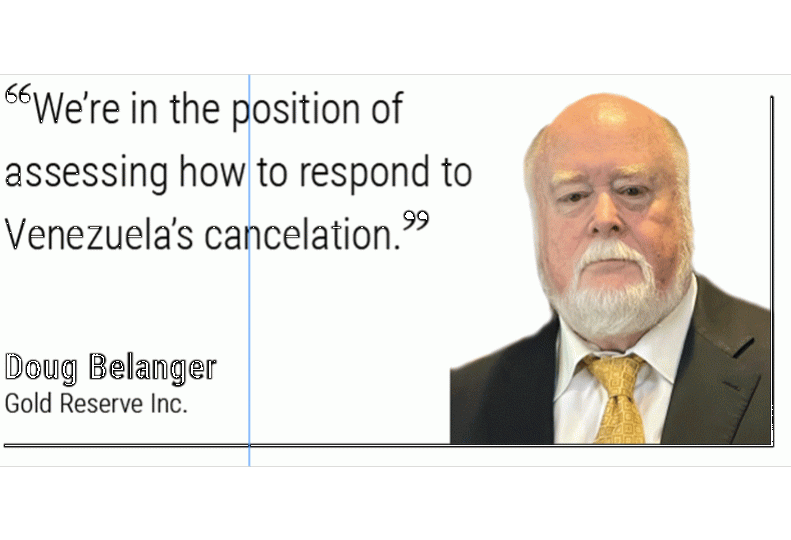What's happening with Gold Reserve in Venezuela
Venezuela nixes rights; Belanger plans to retire

Doug Belanger, longtime president of Gold Reserve Inc., says the company will have financial reserves to continue operating for a number of years when he retires at year-end. But the company’s position with a South American gold, copper, and silver mine may have gotten even more complicated recently.
Gold Reserve, a Canadian-based mining company with executive offices in Spokane, announced earlier this year that Venezuela’s Ministry of Mines had issued a resolution to revoke Siembra Minera SA’s mining rights for a gold mining project in southeast Venezuela due to alleged noncompliance with certain mining regulations.
Gold Reserve owns 45% of Siembra Minera, with the Venezuelan government owning the majority 55% pursuant to a 2016 settlement agreement reached through international arbitration. In the settlement agreement, Venezuela also agreed to pay $1 billion to Gold Reserve for investments and research the company had made before the project was expropriated by the Venezuelan government in 2008.
Belanger contends that any noncompliance by Siembra Minera SA is due to failure or inaction by the Venezuelan government.
“We’re in the position of assessing how to respond to Venezuela’s cancelation,” he says. “One avenue is to make another claim under international arbitration.”
The company has received $254 million pursuant to the settlement agreement. The remaining unpaid amount, which is delinquent, is $942 million, including $164 million in interest, as of June 30, according to Gold Reserve’s second-quarter financial statement.
The Journal last reported on Gold Reserve in mid-2021 when Belanger, company chairman James Colman, and CEO Rockne Timm took voluntary pay cuts ranging from 25% to 50%, resulting in annual cash savings of about $1.1 million. The move was done in part to improve Gold Reserves financial condition while the Venezuelan government is behind on money owed to Gold Reserve.
Gold Reserve hasn’t received payments since the U.S. imposed sanctions in 2019 that prohibit transactions with certain industries tied to the Venezuelan government, including its gold and banking industries. The sanctions were imposed when the Nicolás Maduro regime usurped power from Venezuela’s elected national assembly, creating a “fundamental break in Venezuela’s legitimate constitutional order,” according to a White House statement at the time.
The sanctions also impede Gold Reserve’s ability to develop the Siembra Minera mine, which the company has estimated will generate more than $20 billion in revenue during its 45-year lifespan, potentially making it among the top five gold producers in the world.
The sanctions aren’t meant to stop parties legitimately owed money from trying to collect it, Belanger says. If Venezuela were willing to pay its obligations, Gold Reserve would have to obtain a special license for limited transactions, he says.
For example, he says, Chevron Corp. has limited license to maintain its operations in Venezuela, although it can’t expand operations there under the U.S. sanctions.
“Sanctions put in a degree of control, so (U.S. authorities) have the ability to look at something before it happens,” Belanger says.
He says the U.S. sanctions ultimately may force Venezuela to capitulate to international demands.
“Sanctions really do muck up an economy,” he says. “Every U.S. dollar-based transaction has to be reported to the U.S. Treasury.”
Belanger, 69, says Gold Reserve will be in “good shape for a number of years,” when he retires Dec. 31, after 34 years with the company.
According to Gold Reserve’s latest quarterly earnings report, the company had $46 million in cash on hand and $57.5 million in total assets, compared with $53.3 million cash and $66.8 million in assets in the year-earlier quarter.
The company had a net loss of $2.2 million, or 2 cents per diluted share, in the second quarter, compared with a net loss of $1.7 million, or 2 cents per share, in the year-earlier quarter.
Belanger also plans to step down from the company’s board of directors, although he’ll remain available to the company on a consulting basis.
He says his replacement hasn’t been named. “They’re probably going to make a couple of other (staff) additions,” he adds.
Belanger says he plans in his retirement to focus on his health, spend more time with his family, and continue with volunteer activities.
His retirement announcement follows the recent retirement of Robert McGuinness, Gold Reserve’s former chief financial officer and vice president of finance, who served 28 years with the company. David P. Onzay has been promoted to CFO from corporate controller.
Related Articles
Related Products





